Breadcrumb Trail Links
There isn’t a single pot plant inside Indiva’s south London facility.
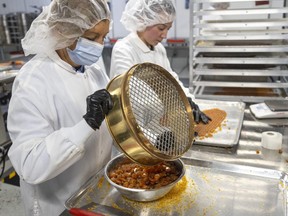 Alba Rincon, left, and Miryam Rojas break up trays of cannabis edibles and sort them at the company’s London plant. Photograph taken on Wednesday, Nov. 30, 2022. (Mike Hensen/The London Free Press)
Alba Rincon, left, and Miryam Rojas break up trays of cannabis edibles and sort them at the company’s London plant. Photograph taken on Wednesday, Nov. 30, 2022. (Mike Hensen/The London Free Press)
Article content
There isn’t a single pot plant inside Indiva’s south London facility.
Advertisement 2
This advertisement has not loaded yet, but your article continues below.
Article content
It has been that way for more than a year at the cannabis company’s 3,700-square-metre plant on Hargrieve Road, where grow rooms have been converted into spaces for making and packaging cannabis-infused edibles.
By clicking on the sign up button you consent to receive the above newsletter from Postmedia Network Inc. You may unsubscribe any time by clicking on the unsubscribe link at the bottom of our emails. Postmedia Network Inc. | 365 Bloor Street East, Toronto, Ontario, M4W 3L4 | 416-383-2300
Thanks for signing up!
Article content
“We are very proud of the fact that we do not grow,” Indiva chief executive Niel Marotta said.
That’s because Indiva has become the leading producer of edibles in Canada, generating around 90 per cent of its revenue from selling products like chocolates, cookies and gummies infused with THC and CBD.
Indiva’s rise to the top of the edibles market — a category that still makes up a small slice of Canada’s cannabis market — has been years in the making.
While many pot producers focused on building growing capacity when recreational marijuana was legalized in 2018, Indiva set its sights on edibles, even though the products weren’t approved for sale until a year later.
Advertisement 3
This advertisement has not loaded yet, but your article continues below.
Article content
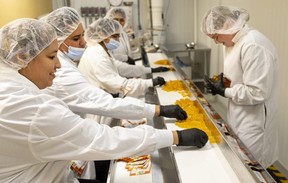 Ivelyses Castelanos and her sister Belvis Vega, both at left, work on a packaging line at Indiva as employees manually pick up the edibles and put them in small packages. Photograph taken on Wednesday, Nov. 30, 2022. (Mike Hensen/The London Free Press)
Ivelyses Castelanos and her sister Belvis Vega, both at left, work on a packaging line at Indiva as employees manually pick up the edibles and put them in small packages. Photograph taken on Wednesday, Nov. 30, 2022. (Mike Hensen/The London Free Press)
That calculation paid off when the industry experienced a massive oversupply of cannabis — a problem that persists today — and struggled to compete with the black market on price and product selection, leading to industry-wide layoffs.
Indiva, meanwhile, has grown its workforce to more than 160 employees and has its products on store shelves at pot shops in every province and territory.
The company’s “organic growth” is a source of pride for Marotta, who has been at the helm since 2015, making him one of the longest-serving cannabis executives in the country.
“We haven’t done any acquisitions. We’ve done this out of one facility,” he said of Indiva’s growth.
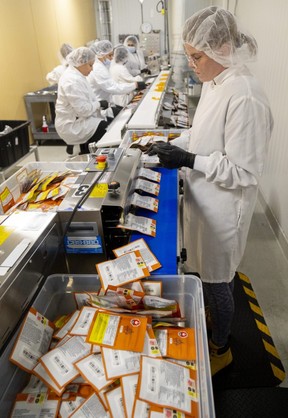 Miranda Boisvert of Indiva seals cannabis edibles in packages at the company plant in London. Photograph taken on Wednesday, Nov. 30, 2022. (Mike Hensen/The London Free Press)
Miranda Boisvert of Indiva seals cannabis edibles in packages at the company plant in London. Photograph taken on Wednesday, Nov. 30, 2022. (Mike Hensen/The London Free Press)
The company’s year-to-date net revenue increased nearly 10 per cent to a record $25.1 million, according to third-quarter results released earlier this month. Edibles sales hit $7.3 million in the quarter — making up 90.7 per cent of the company’s net revenue — up from $6.9 million in the same time last year, the company said.
Advertisement 4
This advertisement has not loaded yet, but your article continues below.
Article content
Marotta sees room for growth in the edibles market that accounts for just five per cent of pot products sold in Canada, compared to around 15 per cent in the United States.
He is critical of Health Canada’s rule limiting THC content to 10 milligrams per package.
“That is absolutely too low. When you look at U.S. markets, those minimums typically start at 100 mg,” Marotta said of THC, the psychoactive component in cannabis.
Both cannabis companies and consumers have urged the government to increase the THC limit, warning that failing to do so pushes people to the black market, where high-potency edibles are a popular item.
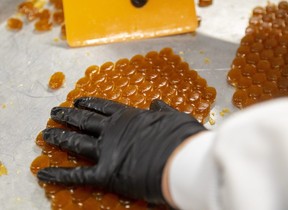 Miryam Rojas breaks up waffles of edible cannabis made at Indiva’s London plant. Photograph taken on Wednesday, Nov. 30, 2022. (Mike Hensen/The London Free Press)
Miryam Rojas breaks up waffles of edible cannabis made at Indiva’s London plant. Photograph taken on Wednesday, Nov. 30, 2022. (Mike Hensen/The London Free Press)
The legal market has been steadily chipping away at the illicit market in Ontario as more retail stores open. More than 1,500 now operate in the province, including nearly 50 in London, and account for 56.9 per cent of cannabis sales, according to the most recent statistics from the Ontario Cannabis Store.
Advertisement 5
This advertisement has not loaded yet, but your article continues below.
Article content
A professor who studies the cannabis industry says the edibles market shows room for growth, citing the products’ appeal to new users looking for smoke-free options, but also cautioned that public health officials are still wary of the risks.
“Edibles are a category that are most likely to be consumed accidentally,” said Michael Armstrong, a professor at Brock University’s Goodman school of business. “That is the big challenge to edibles and the policy solution to that is not obvious.”
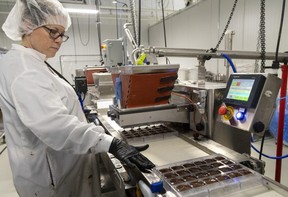 Kirsten Norton, a chocolatier for Indiva, fills trays chocolate edible cannabis at the London plant. Photograph taken on Wednesday, Nov. 30, 2022. (Mike Hensen/The London Free Press)
Kirsten Norton, a chocolatier for Indiva, fills trays chocolate edible cannabis at the London plant. Photograph taken on Wednesday, Nov. 30, 2022. (Mike Hensen/The London Free Press)
Industry insiders are hopeful that a review of the Cannabis Act now underway will address the edibles issue along with other problems plaguing the four-year-old sector.
But Armstrong said the review is focused more on public health and safety than on calls for change from cannabis companies.
“We’ll probably see some tinkering of the regulations,” he said, singling out changes to packaging and labelling requirements as targets of possible change.
Twitter.com/DaleatLFPress
-

London cannabis company Indiva secures $22M investment
-

Cannabis-infused chocolates first product as London producer gets approval
Share this article in your social network
Advertisement
This advertisement has not loaded yet, but your article continues below.
Advertisement 1
This advertisement has not loaded yet, but your article continues below.
Comments
Postmedia is committed to maintaining a lively but civil forum for discussion and encourage all readers to share their views on our articles. Comments may take up to an hour for moderation before appearing on the site. We ask you to keep your comments relevant and respectful. We have enabled email notifications—you will now receive an email if you receive a reply to your comment, there is an update to a comment thread you follow or if a user you follow comments. Visit our Community Guidelines for more information and details on how to adjust your email settings.
https://news.google.com/__i/rss/rd/articles/CBMiWWh0dHBzOi8vbGZwcmVzcy5jb20vbmV3cy9sb2NhbC1uZXdzL2ZvY3VzLW9uLWNhbm5hYmlzLWVkaWJsZXMtcGF5cy1vZmYtZm9yLWxvbmRvbi1jb21wYW550gEA?oc=5




